The most common prepositions in English for the Intermediate level

About course
This course will help you understand prepositions in the English language. What prepositions to use when talking about time, movement, and space? For example, how to say: in time or on time? Think of or think about?
Twelve lessons, rules, exercises, texts, and tables. All so that you learn how to use prepositions correctly in English.
-
Level: Intermediate
-
80 minutes
- 13 lessons
-
51 tasks
-
Teacher's language: English
-
Interactive exercises
Course program
13 LESSONS
LESSON 1
Prepositions of place and time
LESSON 2
Prepositions of place and time
LESSON 3
Prepositions in / within / among
LESSON 4
Prepositions behind / in front of / next to / between
LESSON 5
Prepositions off/ of
LESSON 6
Prepositions around / past / through
LESSON 7
Prepositions in / during / since / for
LESSON 8
Prepositions far from / close to / opposite
LESSON 9
Set expressions with prepositions. At the end / in the end / at the beginning / in the beginning
LESSON 10
Set expressions with prepositions. On time / in time / it’s about time / in the meantime
LESSON 11
Set expressions with prepositions. Heard of / about, think of / about
LESSON 12
Phrases with in / of / out / at
LESSON 13
Phrases with on / with / to / for
Who is this course for
The course will suit you if you missed this topic once and want to revise it.
This course is suitable for those with an intermediate level of English.
If you are often confused about prepositions, this course will definitely help you.
Also, teachers and tutors will like this course. A well-developed topic, good exercises and relevant texts are a ready-made lesson for your students.
What will you get after the course
You will receive lists of the most common prepositions in the English language. You will also practice and learn these prepositions. You will have handy tables with rules at hand that you can always refer to.
-
Level: Intermediate
-
80 minutes
- 13 lessons
-
51 tasks
-
Teacher's language: English
-
Interactive exercises
You can put your phone on the table, in the table or under the table. If it's a chair, you can put it near the table. These tiny words – on, in, under, near – are called prepositions. If you want to master the language, you need to learn all the English prepositions and understand the peculiarities of their use. Booyya course will be indeed happy to help you with it!
Several categories of prepositions in English
Why are they required? Their function is to determine where, how, when and with whom the object or subject interacts. It is a separate part of speech, but it is used as an auxiliary and has no meaning without a verb or an adjective.
According to the rules of grammar, they are classified according to their use. That is, these are prepositions of place, time, movement and cause.
Prepositions of place
This category includes words by means of which we can answer the question "where is it?". The main three are at, in, on. These ones are very tricky, as they can have many interpretations and translations into other languages. For example, you can say “at work”, “at the exit”, but the meaning of prepositions is different.
Prepositions of time
This category answers the question "when?" or "how long?". It is something brand new, but old friends are waiting for us again – at, in, on. They are used to saying what time you plan to leave the house – “at 9 o'clock”. Or when was the last time you visited your grandmother – let's say, “on Christmas Day”.
However, there are many more in the English language. This category should be composed of the following commonly used words: for, since, by, during.
Prepositions of movement
This category helps you to understand where and from where a car or other object/person is moving. Here, it is of utmost importance to remember the following words: to, towards, through, into, across, over, along, in, on. For example, to talk about the rain that falls on the roof, the construction “on the roof” will be useful.
Prepositions of clause
This category helps you to explain why this or that action/event took place. Among these prepositions in English, the following are commonly used: because of, for, due to, thanks to. To say that you won the competition because you've had years of training, you need the combination “thanks to”.
Let's learn the rules of using prepositions in English with the help of a course from Booyya
The main problem in studying this topic is hidden in a variety of meanings they can have depending on the context. Therefore, it is very important to learn them in context. The course from the Booyya platform is built on this principle. In 13 lessons, it will help anyone to master the peculiarities of prepositions usage in English. This course is advantageous:
-
everything is in one place ;
-
necessary for making your speech fluent and understanding of English;
-
all grammar material is divided into separate lessons for the convenience of students since it is much easier to learn new material step by step than swallow a large amount of information at once;
-
grammar rules are accompanied with examples in the form of understandable texts for Intermediate students;
-
interactive exercises help you to consolidate and better understand new material;
-
tables created by experienced teachers are a convenient application that will help you quickly refresh your knowledge before an exam or writing a cover letter for a resume.
Have you ever thought before that you can literally learn such rules in 13 days? It’s likely to do it with the help of Booyya platform. What's more, you can enroll in this course anywhere and anytime. The main thing is to have a phone or laptop with Internet access.
- access to all 212 English courses on the platform, except for the English PRO series
- 2 - 4 new courses every month
- exclusive access to SUBSCRIPTION ONLY courses
- access to the Smarte+ - smart online tool for English practice
- unlimited studying for the selected period
- access to self-study English plans














































.png)

.jpg)


.png)